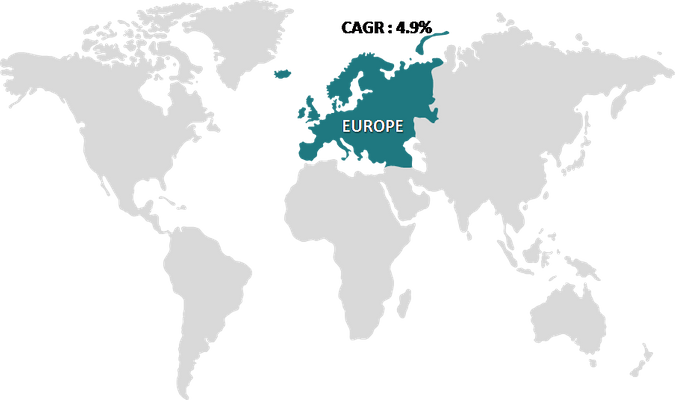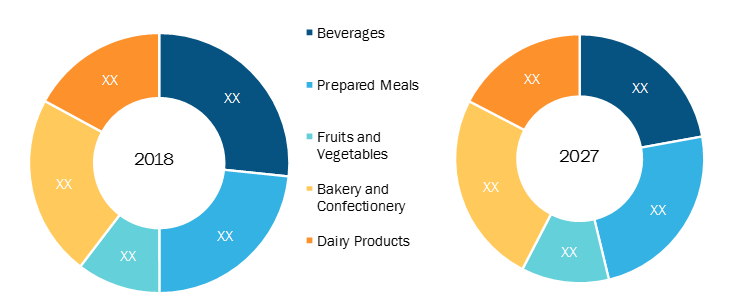The Europe food service packaging market is accounted to US$ 13,178.1 Mn in 2018 and is expected to grow at a CAGR of 4.9% during the forecast period 2019 – 2027, to account to US$ 20,143.0 Mn by 2027.
The food service packaging market serves the food service industry, consisting of offline as well as online food service stores that are serving a huge number of people in the Europe region. Consumers in this era are adopting packaged food items, including RTE and RTC food products, confectionaries, and many more. Most of these products are packaged in plastic packs or a combination of paper & plastic packets, which is further influencing the market for food service packaging. The food packaging industry is transforming at a constant rate, driven by changing packaging technology, disposal regulations, and market acceptability. Packaging plays an essential role in maintaining quality and keeping food safe during handling and transportation. Food service packaging offers a marketing medium to the food service providers and helps improve customer satisfaction levels as well as information transmission. Food contact materials and food packaging are essential to provide consumers in Europe with safe and nutritious food. It protects the food products from contamination caused by microorganisms, air, and moisture, and helps catalytic activity in fresh food.
Europe Food Service Packaging Market

- This FREE sample will include data analysis, ranging from market trends to estimates and forecasts.
Market Insights
Changing customer preferences for high-quality and standard products to favor the Europe food service packaging market
The food packaging industry is transforming at a constant rate, driven by changing packaging technology, disposal regulations, and market acceptability. To ensure the safety of individuals, food packaging plays an essential role, as a material used for packing diversified food items needs to be hygienic for the health of the consumers. With endless practices of developing packaging solutions, risks associated with food packaging design are low and is reducing due to practices such as ISO 22000 mandates, and audit schemes. The adoption of risk assessments on all the raw materials and packaging materials assist in ensuring safety in the food packaging design. The design of food packaging continues to transform with substantial scientific and technological progress, to extend the shelf life of the product and make it safer for the consumers as well. The food packaging design on the retailer shelves the customer observes is different from the design, which was ten years ago. This change happened due to advancements made in food safety and packaging solutions, which has raised the level of efficiency, convenience, and sustainability.
Material Insights
The Europe food service packaging market is segmented based of material as plastic, metal, and, others. The plastic segment holds the largest share in the Europe food service packaging market. Plastic packaging is a flexible form of packaging, which allows food service providers to customize its shape, style, and size as per their customers’ requirements. Plastic packaging is preferred in the foodservice industry as it is light-weight and does not require a lot of storage space. Furthermore, the plastic packaging products used in food packaging are easy to transport. Owing to its properties such as highly durable and resistant to external influences, it helps to preserve the packaged food products. The plastic packaging can survive in extreme environments, and it does not easily degrade in hot temperatures, and therefore, maintain the integrity and taste of the food & beverage. It also protects the products from moisture, oxygen, dust, light, and odors.
Packaging Type Insights
The rigid packaging type holds the largest share in the Europe food service packaging market. The rigid packaging consists of cans, bottles, jars, ampules, plastic pots, aerosol containers, tins, trays, cups, bowls and aluminum bottles which are used to pack and store different food and beverage items. These container gives physical protection to the food which is not offered by flexible packaging. These containers are robust in nature due to amount of material utilized for their production. The rigid containers provide airtight hermetic seal which helps in preserving the food item from contamination. However, they are expensive than flexible packaging. The rigid packaging includes, glass, metal, wooden containers, paperboard, pottery pots and jars, and plastic bottles, jars, tubes.
Application Insights
The beverage segment holds the largest share in the Europe food service packaging market. The beverage sector is amongst the front-liners, where huge and significant investments are made for business expansion and technological modification. The packaging of both carbonated and non-carbonated beverages is a challenging technological branch in a food processing /packaging industry. The changing scenario of beverage industry driven by dynamic consumer preferences and endless innovations in packages has transformed the scope for packaging industry exponentially. Innovations in material-based systems on intelligent packaging for beverages is propelling the growth of beverage packing.
Rest of Europe Food service packaging Market by Applications

- This FREE sample will include data analysis, ranging from market trends to estimates and forecasts.
EUROPE FOOD SERVICE PACKAGING MARKET SEGMENTATION
Europe Food Service Packaging Market, by Material
- Plastic
- Metal
- Others
Europe Food Service Packaging Market, by Packaging Type
- Flexible
- Rigid
Europe Food Service Packaging Market, by Application
- Beverages
- Prepared Meals
- Fruits and Vegetables
- Bakery and Confectionery
- Dairy Products
- Others
Company Profiles
- Amcor plc
- Ball Corporation
- Berry Global, Inc.
- Dow Inc.
- DS Smith PLC
- Huhtamäki Oyj.
- Reynolds Group Holding
- Sealed Air Corporation
- WestRock Company
Europe Food Service Packaging Report Scope
| Report Attribute | Details |
|---|---|
| Market size in 2018 | US$ 13,178.1 Million |
| Market Size by 2027 | US$ 20,143.0 Million |
| CAGR (2019 - 2027) | 4.9% |
| Historical Data | 2016-2017 |
| Forecast period | 2019-2027 |
| Segments Covered |
By Material
|
| Regions and Countries Covered |
Europe
|
| Market leaders and key company profiles |
|
- Historical Analysis (2 Years), Base Year, Forecast (7 Years) with CAGR
- PEST and SWOT Analysis
- Market Size Value / Volume - Regional, Country
- Industry and Competitive Landscape
- Excel Dataset
Recent Reports
Testimonials
Reason to Buy
- Informed Decision-Making
- Understanding Market Dynamics
- Competitive Analysis
- Identifying Emerging Markets
- Customer Insights
- Market Forecasts
- Risk Mitigation
- Boosting Operational Efficiency
- Strategic Planning
- Investment Justification
- Tracking Industry Innovations
- Aligning with Regulatory Trends






















 Get Free Sample For
Get Free Sample For